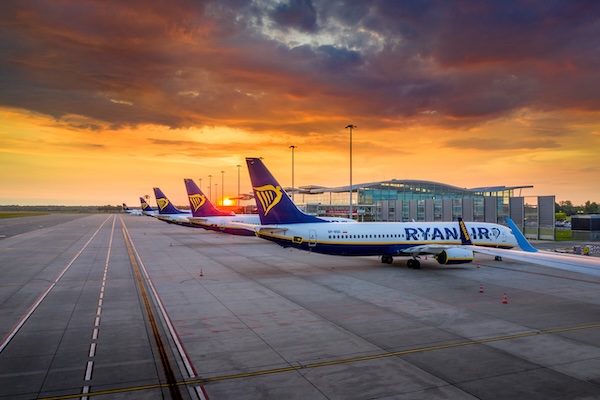Ryanair anticipates a strong increase in UK passenger numbers, projecting a rise of over 10 million annually to reach 65 million by 2030.
This bold forecast is part of Ryanair’s strategic expansion plan, which includes significant investments in new aircraft and infrastructure.
Expansion Plans and Economic Impact
Ryanair projects a substantial increase in its UK operations, with passenger numbers expected to surge by over 10 million annually, reaching a total of 65 million by the end of the decade. This ambitious target is a rise from 53 million passengers last year, making up a significant 20% of the UK market. Such growth underscores Ryanair’s strategic commitment to strengthening its presence within the UK transportation sector.
The airline’s expansion is not only about numbers. Michael O’Leary, Ryanair’s chief executive, has outlined a broader strategy that emphasises economic contributions. According to an independent report by York Aviation, Ryanair boosts the UK economy by £14 billion annually and supports 98,000 jobs. This contribution is central to Ryanair’s operations, involving a fleet of 115 aircraft and 600 routes.
Infrastructure and Fleet Expansion
Ryanair plans to enhance its infrastructure with the introduction of a new engineering training facility at Prestwick, complementing the 1,000 new jobs for UK pilots, cabin crew, and engineers envisaged by 2030. Such developments are expected to create a robust training and employment pipeline, crucial for meeting future aviation demands in the region.
By 2030, Ryanair intends to base 20 new fuel-efficient Boeing 737 Max 10 aircraft in the UK. These advancements align with the airline’s commitment to environmental sustainability, with aircraft designed to reduce fuel consumption and CO2 emissions by 20%, and decrease noise pollution by 50%.
Environmental and Economic Considerations
Ryanair’s strategy includes significant environmental considerations. The Boeing 737 Max 10 aircraft exemplify this approach with their lower emissions and noise levels, directly addressing pressing environmental concerns.
Moreover, the economic aspect is equally pivotal. O’Leary highlighted Ryanair’s vital role in linking the UK with European markets, reinforcing the importance of affordable air travel for an island nation at Europe’s periphery. Competition and connectivity are viewed as essential for economic vitality.
The airline’s operations last year brought over £4.7 billion of European visitor expenditure to the UK. This figure highlights Ryanair’s capacity to attract international tourism, supporting economic growth across UK regions.
Challenges in UK Aviation Policy
Michael O’Leary has also been vocal about challenges within the UK aviation policy framework. He has criticised the operational inefficiencies of the UK’s air traffic control provider, Nats, and the high Air Passenger Duty (APD) rates. These issues, according to O’Leary, hinder the UK’s aviation potential and place an unnecessary financial burden on passengers.
Ryanair has praised the partial reduction in APD on domestic flights from April 2023, a move that facilitated the airline’s expansion of domestic routes. However, O’Leary argues for the complete abolition of APD to unleash full growth potential, positing that the current tax hampers the development of low-cost air connections with Europe.
Future Growth and Strategic Investment
Looking forward, Ryanair is committed to continuing its growth trajectory in the UK. The airline plans to add more domestic routes, exploiting the reduced APD’s benefits.
An integral part of Ryanair’s strategy is investment in new, more efficient aircraft and infrastructure, ensuring that the airline remains competitive and environmentally responsible. The focus is on enhancing connectivity and supporting regional economies.
The choice of airports and strategic investments underline Ryanair’s intent to foster economic and operational synergy across the UK. This strategy is expected to deliver long-term benefits for both the airline and its host communities.
Leadership Perspective
Michael O’Leary underscored the enduring importance of maintaining low-cost access between the UK and Europe. He stressed that as an island economy, such connections are vital for prosperity.
O’Leary stated, “Ryanair’s growth is intertwined with the UK’s economic fortunes, and we stand ready to support that development through our extensive route network and competitive pricing.”
Conclusion
Ryanair’s forecasted rise in UK passenger carryings indicates robust market confidence. This expansion is set to contribute significantly to the UK’s economic landscape, despite current policy challenges.
Ryanair’s expansion plans are poised to significantly impact the UK economy, creating jobs and enhancing connectivity.
Despite current aviation challenges, Ryanair remains committed to providing affordable travel options and supporting economic growth across the UK.

